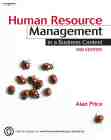Adapted from Chapter 2 of Human Resource Management in a Business Context, 2nd edition. Copyright © 1997-2006 Alan Price 2004.
"... among business ethicists there is a consensus favoring the stakeholder theory of
the firm - a theory that seeks to redefine and reorient the purpose and the activities of
the firm. Far from providing an ethical foundation for capitalism, these business ethicists
seek to change it dramatically." (Marcoux, 2000).
Windsor (1998) points out that Stakeholder theory is arguably at an early stage of
intellectual development, identifying. Donaldson and Preston (1995) as having 'only recently
revolutionized our conception of stakeholder theory by delineating nested descriptive,
instrumental, and normative dimensions with the latter at the core.' Windsor also notes
that Donaldson and Preston characterize 'the bulk of earlier stakeholder literature as blurred
theorizing (1995: 66).
Windsor (1998) states that:
"The lack of an explicit specification of the relationship between stakeholder and economic
reasoning is a major lacuna. While stakeholder theory has achieved a degree of acceptance in
the strategic management literature, now being commonly noted in new textbooks as a tool of
strategic analysis, there is substantial resistance to stakeholder reasoning in the
financial-economics literature. There is a counter-movement favoring stronger stockholders’
rights and corporate-governance standards; shareholder value and economic value-added notions
are gaining currency."
Shareholder theorists such as Milton Friedman argue that managers should serve the
interests of a firm's owners - shareholders. They contend that the social obligations of the
firm are limited to:
- making good on contracts
- obeying the law
- adhering to ordinary moral expectations
Briefly, "obligations to nonshareholders stand as sideconstraints on the pursuit of shareholder
interests (Marcoux, 2000)."
Marcoux asks, in the Friedman vein, "... why firms are obligated to give something back to those
to whom they routinely give so much already. Rather than enslave their employees, firms
typically pay them wages and benefits in return for their labor. Rather than steal from
their customers, firms typically deliver goods and services in return for the revenues
that customers provide. Rather than free ride on public provisions, firms typically pay
taxes and obey the law. Moreover, these com-pensations are ones to which the affected
parties or (in the case of communities and unionized employees) their agents freely agree.
For what reasons, then, is one to conclude that those compensations are inadequate or
unjust, necessitating that firms give something more to those whom they have already
compensated?"
Even if one accepts the validity of Stakeholder theory as a general approach, there remains a
dispute over the meaning of 'stakeholder'. For example, Windsor (1998) considers that: "who is
logically a stakeholder is in fact an unresolved matter in the literature ..." Whereas Freeman's seminal
conception was that the stakeholder community should include everyone who affected or was
affected by an organization - a widely accepted definition - Donaldson and Preston (1995: 86)
distinguished between non-stakeholder influencers and "true" stakeholders. They argued that
stakeholdership as a concept is more than just a union of influence and impact. Windsor (1998)
describes this restricted class of stakeholders as contributing beneficiaries.
>

